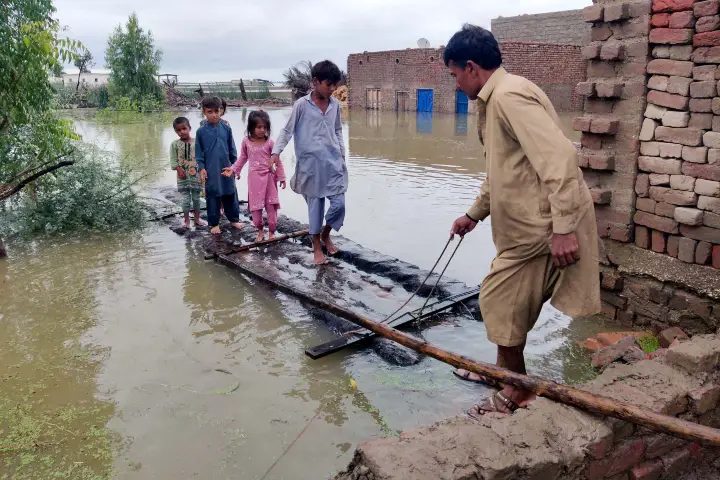

Floods hit Pakistan again; last year losses were about $40 billion only due to heavy rains (Photo credit-IANS)
Concerns for Pakistan’s policymakers have risen as heavy rains lashed several parts of Pakistan including the Khyber Pakhtunkhwa and Balochistan, crops. These regions were damaged by heavy floods last year as well. Now the untimely rains would further deal a blow to the critical agriculture sector. The country is already reeling under food shortage. The rains, many fear, will further cripple the economy.
Rice, maize and sugarcane are among the main crops grown in Khyber Pakhtunkhwa, the fourth largest province in the South Asian nation. Heavy rains could hit Sindh as well where cotton, rice and wheat besides other crops are widely grown.
The Food and Agriculture Organisation’s (FAO) report on the Global Information and Early Warning System has named Pakistan along with 19 other countries facing the risk of heavy rains this year.
The country is yet to recover from the impact of last year’s devastating floods which cost the economy around $40 billion—much higher than initial estimates. “The country’s fragile economy will collapse if there are above normal rains this year too. Pakistan has not yet managed to shake off the impact of last year’s floods which had swept large swathes of crops,” an analyst dealing with Pakistan and Afghanistan told India Narrative.
The widespread destruction of crops along with other economic challenges have led to an acute food crisis in the country.
Pakistan’s food imports have been steadily rising. The economic crisis has led to a surge in food prices. Cost of food in Pakistan increased 48.07 per cent in April compared to the same month in the previous year. Even as a large number of Pakistanis go hungry, the country’s Ministry of National Food Security and Research in a recent report said that food worth $4 billion – 19.6 million tonnes, accounting for 26 per cent of Pakistan’s total food production, is wasted every year, leading to a drain on the economy. The report will bring much embarrassment to the Shehbaz Sharif government, especially with approaching general elections.
According to local ARY New, most food items have been wasted for not meeting the criteria of appearance, size and colour despite the steps to ensure food security.
Meanwhile, the World Bank said that the loss to the gross domestic product as a direct impact of last year’s floods could be around 2.2 per cent.
Also read: Pakistan’s draconian blasphemy laws likely to push economy into deeper crisis
Prime Minister Narendra Modi attended the centenary celebrations of the revered Jain spiritual leader Acharya…
Prominent human rights activist Manzill Murshid anticipated that the upcoming election in Bangladesh will bring…
Iranian Foreign Minister, Seyed Abbas Araghchi, said on Saturday that President Donald Trump should put…
The national capital is hosting ten representatives from the American state of Montana, who are…
An earthquake of magnitude 6.0 struck the Philippines in the early hours of Saturday, as…
NATO's recent decision to ramp up military spending will not significantly impact Russia's security, Foreign…